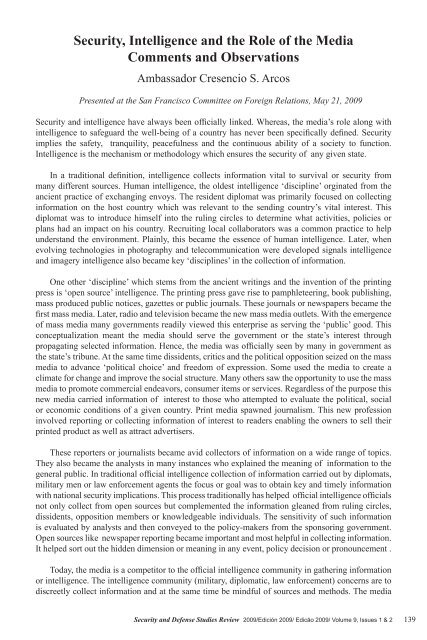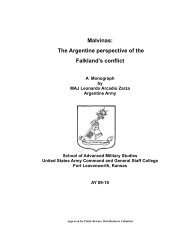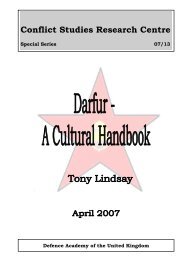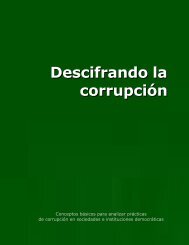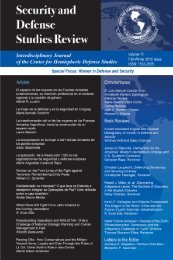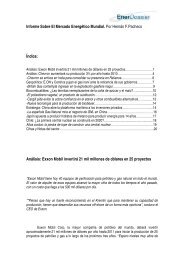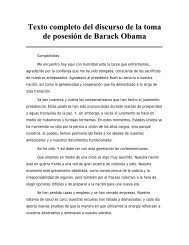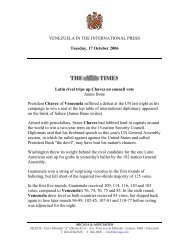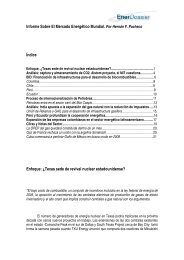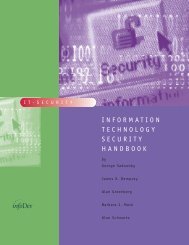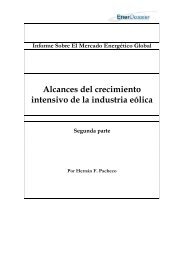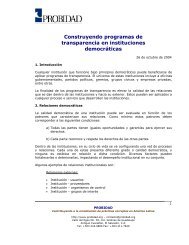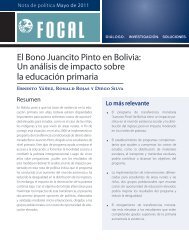Fortunately, my predecessors in the Department of <strong>Defense</strong> <strong>and</strong> my predecessor counterparts inthe Department of State have made such dialogue possible. Beginning in 2006, the State Departmenthas arranged a Sub-Regional Dialogue with China on the Western Hemisphere. Among others,representatives from the National <strong>Security</strong> Council, <strong>Defense</strong> Department, State Department, USAID,<strong>and</strong> Commerce Department have participated in this forum with representatives from China’sDepartment of Latin America <strong>and</strong> Caribbean Affairs, the Department of North America <strong>and</strong> Oceana,<strong>and</strong> the Chinese Embassy in Washington. The first Dialogue in 2006 was held in China <strong>and</strong> hasalternated between Washington <strong>and</strong> Beijing ever since.The Dialogue provides the perfect opportunity to exchange ideas on potential cooperationin the region, as well as to provide continuity in articulating <strong>and</strong> clarifying our respective goals<strong>and</strong> objectives. The next Dialogue should occur in the near-future <strong>and</strong> I look forward to not onlyattending, but actively participating. My goals are not limited simply to continued participation; Iwill also seek to exp<strong>and</strong> the Department of <strong>Defense</strong>’s role in the Dialogue. In my view, this forumshould be as broad <strong>and</strong> robust as possible.In particular, I will be an advocate for exploring avenues in which we can pursue a collectiveapproach to non-traditional threats in the region, especially in the area of counter-narcotics <strong>and</strong>,perhaps, other forms of trafficking. There seems to be consensus on this issue, the challenge at h<strong>and</strong>is how to turn such consensus into concrete action. Of course, I am also eager to hear what areas ofcooperation China’s delegation views as promising.I have made frequent mention today of a new era of engagement, of the need for collectiveapproaches, <strong>and</strong> of the unprecedented inter-connectivity of the contemporary international community.I fear, however, that my comments today might give the false impression that I am speaking of a newera of engagement only between governments, that the need for collective approaches is exclusivelythat of heads-of-state, diplomats, <strong>and</strong> other government officials, that the inter-connectivity I havehighlighted is limited to the public sector. To be clear, that is not the impression I want to give, quitethe contrary.A new era of engagement requires that the larger civil society work on these issues. A collectiveapproach dem<strong>and</strong>s that academics, think-tanks, foundations, international organizations, the privatesector, government, <strong>and</strong> ordinary citizens from within <strong>and</strong> between nations have an ongoingconversation about the most pressing policy challenges of the day. In the process, the interconnectivityalready omnipresent in the world will only deepen. And that is precisely why I amlooking forward to hearing <strong>and</strong> learning from the panelists <strong>and</strong> audience today, all of whom bring awealth of diverse experience <strong>and</strong> perspective.Thank you.138<strong>Security</strong> <strong>and</strong> <strong>Defense</strong> <strong>Studies</strong> <strong>Review</strong> 2009/Edición 2009/ Edicão 2009/ Volume 9, Issues 1 & 2
<strong>Security</strong>, Intelligence <strong>and</strong> the Role of the MediaComments <strong>and</strong> ObservationsAmbassador Cresencio S. ArcosPresented at the San Francisco Committee on Foreign Relations, May 21, 2009<strong>Security</strong> <strong>and</strong> intelligence have always been officially linked. Whereas, the media’s role along withintelligence to safeguard the well-being of a country has never been specifically defined. <strong>Security</strong>implies the safety, tranquility, peacefulness <strong>and</strong> the continuous ability of a society to function.Intelligence is the mechanism or methodology which ensures the security of any given state.In a traditional definition, intelligence collects <strong>info</strong>rmation vital to survival or security frommany different sources. Human intelligence, the oldest intelligence ‘discipline’ orginated from theancient practice of exchanging envoys. The resident diplomat was primarily focused on collecting<strong>info</strong>rmation on the host country which was relevant to the sending country’s vital interest. Thisdiplomat was to introduce himself into the ruling circles to determine what activities, policies orplans had an impact on his country. Recruiting local collaborators was a common practice to helpunderst<strong>and</strong> the environment. Plainly, this became the essence of human intelligence. Later, whenevolving technologies in photography <strong>and</strong> telecommunication were developed signals intelligence<strong>and</strong> imagery intelligence also became key ‘disciplines’ in the collection of <strong>info</strong>rmation.One other ‘discipline’ which stems from the ancient writings <strong>and</strong> the invention of the printingpress is ‘open source’ intelligence. The printing press gave rise to pamphleteering, book publishing,mass produced public notices, gazettes or public journals. These journals or newspapers became thefirst mass media. Later, radio <strong>and</strong> television became the new mass media outlets. With the emergenceof mass media many governments readily viewed this enterprise as serving the ‘public’ good. Thisconceptualization meant the media should serve the government or the state’s interest throughpropagating selected <strong>info</strong>rmation. Hence, the media was officially seen by many in government asthe state’s tribune. At the same time dissidents, critics <strong>and</strong> the political opposition seized on the massmedia to advance ‘political choice’ <strong>and</strong> freedom of expression. Some used the media to create aclimate for change <strong>and</strong> improve the social structure. Many others saw the opportunity to use the massmedia to promote commercial endeavors, consumer items or services. Regardless of the purpose thisnew media carried <strong>info</strong>rmation of interest to those who attempted to evaluate the political, socialor economic conditions of a given country. Print media spawned journalism. This new professioninvolved reporting or collecting <strong>info</strong>rmation of interest to readers enabling the owners to sell theirprinted product as well as attract advertisers.These reporters or journalists became avid collectors of <strong>info</strong>rmation on a wide range of topics.They also became the analysts in many instances who explained the meaning of <strong>info</strong>rmation to thegeneral public. In traditional official intelligence collection of <strong>info</strong>rmation carried out by diplomats,military men or law enforcement agents the focus or goal was to obtain key <strong>and</strong> timely <strong>info</strong>rmationwith national security implications. This process traditionally has helped official intelligence officialsnot only collect from open sources but complemented the <strong>info</strong>rmation gleaned from ruling circles,dissidents, opposition members or knowledgeable individuals. The sensitivity of such <strong>info</strong>rmationis evaluated by analysts <strong>and</strong> then conveyed to the policy-makers from the sponsoring government.Open sources like newspaper reporting became important <strong>and</strong> most helpful in collecting <strong>info</strong>rmation.It helped sort out the hidden dimension or meaning in any event, policy decision or pronouncement .Today, the media is a competitor to the official intelligence community in gathering <strong>info</strong>rmationor intelligence. The intelligence community (military, diplomatic, law enforcement) concerns are todiscreetly collect <strong>info</strong>rmation <strong>and</strong> at the same time be mindful of sources <strong>and</strong> methods. The media<strong>Security</strong> <strong>and</strong> <strong>Defense</strong> <strong>Studies</strong> <strong>Review</strong> 2009/Edición 2009/ Edicão 2009/ Volume 9, Issues 1 & 2 139
- Page 4 and 5:
Document: Speech on “Security, In
- Page 6 and 7:
6Security and Defense Studies Revie
- Page 8 and 9:
un tema de seguridad y defensa porq
- Page 10 and 11:
Los Intereses de la República Popu
- Page 12 and 13:
En el marco estratégico descrito e
- Page 14 and 15:
Works (FAW), Geeley, Dongfeng, y Ch
- Page 16 and 17:
interés en participar en el yacimi
- Page 18 and 19:
al emplear personas locales en todo
- Page 20 and 21:
había un banco en Colombia especia
- Page 22 and 23:
ehén de los FARC, escribe de siete
- Page 24 and 25:
estadounidenses en el futuro, y por
- Page 26 and 27:
26Security and Defense Studies Revi
- Page 28 and 29:
Existe numerosa literatura que trat
- Page 30 and 31:
La Tabla 1.1, demuestra que el apor
- Page 32:
Los cuestionamiento a este modelo d
- Page 35 and 36:
….derogaremos la Ley del Cobre y
- Page 37 and 38:
Figura 4.3.Aporte de CODELCO por ve
- Page 39:
Figura 6.Elaboración propia distri
- Page 42 and 43:
de los proyectos de defensa necesit
- Page 44 and 45:
En el caso de las inversiones en de
- Page 46 and 47:
Anexo 1PROTOCOLO DE ACUERDO QUE ACO
- Page 48 and 49:
OECD. “Models of Public Budgeting
- Page 50 and 51:
proyectos nacionales y democrático
- Page 52 and 53:
DesprofesionalizaciónEn la región
- Page 54 and 55:
Según algunos autores, “no sorpr
- Page 56 and 57:
(antinarcóticos), la Guardia Coste
- Page 58 and 59:
supervigilen las acciones intrusiva
- Page 60 and 61:
Quizás una de las fallas provenga
- Page 62 and 63:
Junto con ello se elaboró una nuev
- Page 64 and 65:
Colombia). Por otro, hay una serie
- Page 66 and 67:
Maldonado, Carlos, “Profesionalis
- Page 68 and 69:
policías y militares no ha estado
- Page 70:
La relación entre fuerzas militare
- Page 73 and 74:
dictaduras. En aquellos con más tr
- Page 75 and 76:
efectos de planificación se ha hab
- Page 77 and 78:
BibliografíaAguila, Ernesto y Mald
- Page 79 and 80:
Sherman, Lawrence. et.al. 1973. Tea
- Page 81:
Influenza Pandemic and its National
- Page 84 and 85:
and restaurant services” is expec
- Page 86 and 87:
The ability of the health sector to
- Page 88 and 89: BibliographyAlmond, D. and B. Mazum
- Page 90 and 91: El trabajo parte del supuesto de qu
- Page 92 and 93: es tanto una elección voluntaria c
- Page 94 and 95: Por otro lado, Rusia nunca ha visto
- Page 96 and 97: La Organización del Tratado del At
- Page 98 and 99: liquidez internacional pero tambié
- Page 100 and 101: petróleo recientemente descubierta
- Page 102 and 103: Dentro de este esquema, Estados Uni
- Page 104 and 105: 104Security and Defense Studies Rev
- Page 106 and 107: minimize a number of attempts at fo
- Page 108 and 109: kidnapping, of Maria Edith de Deber
- Page 110 and 111: The political campaign that resulte
- Page 112 and 113: would carry out the more violent ta
- Page 114 and 115: of the EPP so far, is the relative
- Page 117 and 118: to accept ideas, policies or course
- Page 119 and 120: eing killed themselves—the idea t
- Page 122 and 123: In Latin America, the role played b
- Page 124 and 125: the Church to be given to the dying
- Page 126 and 127: from providing military chaplains t
- Page 128 and 129: Perhaps one of the clearest example
- Page 130 and 131: was prepared by the Office of the C
- Page 132 and 133: 132Security and Defense Studies Rev
- Page 135 and 136: Keynote Speech by Dr. Frank O. Mora
- Page 137: If successful, these infrastructure
- Page 141 and 142: Clearly, security, intelligence and
- Page 143 and 144: Contratapa(Contratapa offers, in a
- Page 145 and 146: efforts have become intertwined; fo
- Page 147 and 148: comprensión de sus valores y cultu


